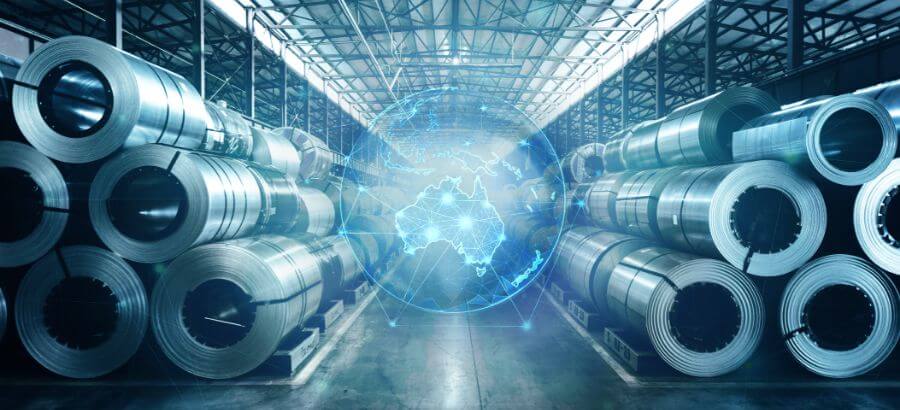It’s no secret that manufacturing companies around the world are rethinking their supply chain strategies. While the concept of reshoring, also known as onshoring, has been a growing trend over the past decade, when the pandemic hit it introduced risk in a way that wasn’t previously considered. With shortages occurring in unexpected sectors and lockdown strategies impacting logistics, companies looked at reshoring to stabilize and strengthen their supply chains. One of the ripple effects of the pandemic was that domestic sourcing, where possible, grew as companies could no longer import products for their production line. Multi-sourcing became more palpable as single sourcing – especially offshore – was understood to be a risky strategy. Many operations turned to lean manufacturing to take any inventory out of their pipelines that could put their supply chain on the line.
Australian reshoring strategies for advanced manufacturing
The pandemic highlighted the need for Australia to manufacture more products for itself. The Australia Institute Centre for Future Work Report revealed that the country ranks last among all OECD developed countries for manufacturing self-sufficiency. While this indicator confirms the dramatic decline of domestic manufacturing in recent years, it also reveals the enormous potential benefits that would be generated by rebuilding manufacturing in Australia back to a size proportional to the national needs. Australia already has all the elements required to build a competitive advanced manufacturing sector. With a relatively young, highly educated workforce and with excellent engineers and scientists, a culture of innovation, modern cities, infrastructure, raw materials, and strong research institutions there is an opportunity to relook reshoring strategies to thrive.
Down under, a drive to reshore Australian-made goods has become a definitive part of the Albanese Labor Government’s ‘Buy Australia’ plan. The consequences of sending manufacturing offshore resulted in the economy becoming exposed as an aftermath of the coronavirus. The government believes that by rebuilding the manufacturing industry through reshoring and various other initiatives, Australia’s economy will become a smart economy, creating job opportunities for local talent. As part of the governments ‘Buy Australia Plan’ the Prime Minister has promised to look at redirecting government contracts away from international competitors to Australian businesses and maximise the use of Australian-made products and materials in future projects. More Australians are also now purchasing locally produced goods, and research from Roy Morgan found 96 per cent of Australians prefer to buy locally made products.
Data-driven decision making to maximize value for manufacturing
Looking at the pandemic as a catalyst, it has now become clear that industry-focused supply chains often operate in silos. A country, or company-focused supply chain, however, has a step up, especially when considering the costs surrounding shipping and sourcing. At a very basic level, the environmental impact of unnecessarily moving products around the world can be ameliorated by reshoring.
Manufacturing is no longer about chasing low-cost countries but rather integrating a set of sophisticated and data-driven tools to help evaluate decisions based on risk – many of which are now made at the board level. It may be cheaper to offshore operations to Asia – or any other location which makes the most financial sense – but the decision-making process is far more complex in today’s current inflationary environment. Those companies looking to reshore need to consider geopolitics as well as where risk exists in addition to their growth market. One trend coined by supply chain experts is ‘friendshoring’, or where a focus is set on setting up space in more predictable destinations with shared political values. This offshoot of deglobalization is why manufacturing cannot be about total-cost-of-ownership (TCO). TCO and logistics are only the first step in supply chain strategy.
Where China was once seen as the world’s factory, today’s supply chain management is far more strategic because ultimately, what is the benefit of cheaper components if you cannot access them? That said, there are aspects to consider when exiting an offshore manufacturing site. Tools and moulds will need to be retrieved and intellectual property (IP) rights are tricky when it comes to ownership. Foreign companies may also be partial to closure taxes.
Cloud ERP to reshore supply chains for manufacturers
A survey by PROS found that 55% of Australian manufacturers intend to reshore their operations to Australia by 2023 following market volatility caused by the pandemic and international relations with neighbouring countries. What will make the reshoring of supply chains in Australia a reality is an ERP system to help drive digital strategy. Manufacturers require practical solutions and Cloud ERP has a central role in enabling reshoring and nearshoring going forward. A digital roadmap requires access to accurate, real-time, and actionable data. From collaboration tools to a complete manufacturing execution system (MES), reshoring will only work when manufacturers have visibility across their supply chain – and that means having the ability to understand changing customer demands and supplier changes from the ground up. A Cloud ERP solution will also enable manufacturers to make use of the latest digitalization technologies and advancements in automation to streamline business processes.
The pandemic has proven that Australia can no longer afford to rely on other countries to fill the shortfall in its supply chain. For Australian-based manufacturers, a fully-integrated ERP solution with embedded analytics is not only required, but it also provides a competitive and cost advantage for balancing a business and its supply chain – especially for those companies looking to reshore.







